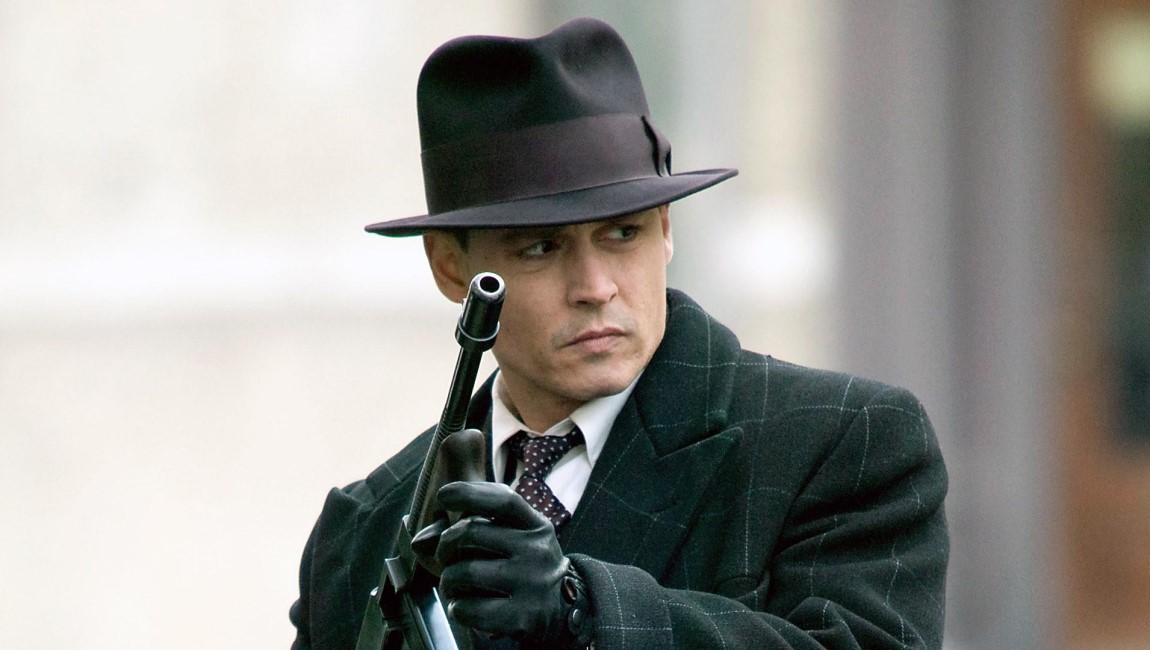The moody and intense Public Enemies is a curious picture, and it’s going to be a great divider, creating two polarized camps of love and hate. It’s paradoxically wandering and aimless and at other times fully engaging. It’s one half of a great film that sometimes becomes — as Michael Mann seems to be as a person — too meditatively obsessed with details that detract from the big picture, but also create a super detailed and rich universe to be transported into. It might just boil down to what you truly value in a film and your subjectivity, but there’s a strong chance that those without patience will find “Public Enemies” dull, and as erratic as bursts of tommy gun fire. It’s one of the most bold and unconventional summer blockbusters released in recent memory, but let’s judge it as a stand-alone picture and not what it should or shouldn’t be in the middle of the summer. After all, its date is really a ruse; it’s a Michael Mann film, it’s not a tentpole blockbuster, and it just happens to be released in July because of its lucrative billing as a “gangster epic,” with the possibility of heavyweight stars Johnny Depp and Christian Bale going toe-to-toe. That alone is admittedly a compelling premise, but if you’re looking strictly for an action film, you’ve come to the wrong place.
And although frequently gripping, intense and masterfully crafted, Mann’s 10th feature is also as uneven as his oeuvre. (Many will disagree on that point. Let them.) It’s emotionally aloof, slow to coalesce and editorially neutral to almost an infuriating degree, not to mention free of most traditional narrative beats, which can make for a laborious experience. Characters don’t have arcs, and in fact Public Enemies so defies the three-act structure that it resembles more of a chronicle of two Alpha Males on a doggedly linear collision course than it does any conventional story. And yet still there’s ancillary pleasures and elements to admire. Marketed as a 1930s action gangster picture, what Mann has really delivered is a meticulous, slow-burning arthouse saga that is incredibly idiosyncratic and bares his stamp everywhere. In this respect, the film resembles the POV-less, two-part Che, realized by Stephen Soderbergh. Expository dialogue is kept to a minimum and we learn about every character through their actions, not their words. And while the apolitical nature of Che was by design, and perhaps necessary given the polarizing figure, this tact utilized in a 1930s gangster picture feels like an odd choice, especially given the lead character, John Dillinger.
The digital photography is another strange aesthetic decision which will leave some viewers feeling one layer further removed, with its emotional coolness. While it can take one out of the picture initially – and the digital framing does look out of time – it’s a far more pleasing and successful approach than the grainy mess of Miami Vice. (Though the shaky, extreme close-ups feel anachronistic in both). Zero character motivations or back story are given here, and the audience joins what feels like a story in progress. Dillinger (Depp) is in the middle of his notorious crime wave and one so huge it creates ripples around the then still-provincial United States. A veritable folk hero, he’s essentially unattainable by the law, as the man-of-the-people celebrity status he enjoys affords him undercover asylum in any city he decides to cool off in. But the politically motivated J. Edger Hoover (unctuously played by Billy Crudup with an adenoidal and off putting accent) has other plans and anoints Melvin Purvis (Christian Bale) to be the star officer of his nascent FBI agency after the golden-boy policeman becomes distinguished for terminating prominent bank robber Pretty Boy Floyd (Channing Tatum, in a brief cameo) with extreme prejudice. A champion of press attention and manipulation, Hoover ostensibly has a long term game plan; realizing the capture of Dillinger and infamous criminals like Baby Face Nelson (Stephen Graham) will get his embryonic Bureau off the ground and the funding it needs, but this can only really be inferred (and if you haven’t read the script you might be scratching your head in certain parts).
Mann’s movies have been increasingly free of the familiar rhythms of mainstream moviemaking, sans big dramatic turning-points, and Enemies is no different, perhaps subtle to a fault. The understatement extends to the performances too: Christian Bale’s FBI man is so subterranean, his character feels either incredibly ill-defined or impossible to get a read on; and truthfully it feels like a bit of both as his only clear motivation seems to be to uphold justice which makes him one-dimensional. (Bale also might want to take a romantic comedy role soon, since his unsmiling methodness is getting to be a bit dour of late.) Other characters — and there are many of them — are equally poorly sketched: Dillinger gang member Charles Makley (Christian Stolte) is clearly a loose cannon, but that’s about all we get out of him. Overloaded with name-brand actors, aside from maybe Stephen Dorff’s Homer Van Meter character — who still has about as much character depth as “loyal Dillinger gang member” — the rest of the names, Giovanni Ribisi, David Wenham, Lili Taylor, Leelee Sobieski, Carey Mulligan, Rory Cochrane and Stephen Lang, are essentially glorified cameo placeholders without a ton of substance. Mann seems so beholden to history that he fails to dramatize much with his docu-drama-like style. Yet at the same time, he clearly wishes to romanticize Dillinger and it’s almost as if he’s at odds with himself. As per usual, the director seems to be obsessed with the nature of great men and how to fetishize their manly actions, many times at the expense of forward narrative. It’s like a careful character study of actions, but not personality and unlike Che, the actions don’t reveal a ton about the still mysterious characters.
The saving grace, both character and acting wise, is the charismatic Johnny Depp and the underused Marion Cotillard. Their love story, which sort of leads Dillinger astray, is presumably the focal point, but there’s so many threads in the picture that the crux becomes hazy. Still, as overly serious as many Mann films can be, Depp’s sly, sang-froid and jovial performance helps the picture from backsliding too much into humorless territory (something that truly marred Miami Vice). His relaxed, live-for-today attitude is well-rounded, possessing a duality of hubris and caution with fiery, impulsive passion. Naturally then, Dillinger is a contradictory persona, giving his coat to a woman he just kidnapped momentarily (just to get away of course) and telling old timers to take their personal earnings back (“we’re here for the bank’s money, not yours”). A cold blooded killer who also happens to be a people person who cares. The beautiful belle, Cotillard as Dillinger’s “blackbird” babe, is steely-eyed, resolute and extremely capable, but her character doesn’t have a lot to do other than put up mild defenses to Depp’s brazen charms. Moreover, the reasons for Dillinger’s passionate love seem rail thin; he seemingly is only magnetically drawn to her for her bewitching looks, as we really don’t get to know them together as a couple.
If Enemies attempts to say anything at all, it’s perhaps that all of us must adapt or face extinction. While love is part of Dillinger’s downfall, what really brings on his fate is his need for attention and thrills. Bank robbing, even by the 1930s is too loud of a game. It draws plenty of Federal attention and headlines that are bad for business and his criminal underworld peers (characterized by a slickster John Ortiz) quickly shut him out (they’re already on to quieter, state of the art illegal business – using a vast phone network and taking advantage of the coastal time zone differences to rig bets on horse races that haven’t taken place yet). Displacing the order of things, Dillinger is persona non grata everywhere and his demise seems inevitable. Enemies is immense and the symphonic grandeur and scope will surely beguile those seduced with craft. An immersive experience, the biggest strength of the somewhat aimless first half of the picture is just how ensconced the viewer becomes in Mann’s precisionist world. The filmmaker only deals with five course meals, no truffles here. When Purvis’ pursuit finally starts to box-in Dillinger, making him “feel the heat,” the picture starts to light up with thrilling and intense action sequences; something finally feels like it’s at stake. When the throttle is let loose, the picture roars. These sequences in the third act are taut and at times mesmerizing, but they also arrive during the three-fourths mark of a two hour and 20 minute film with no discernible structure. A little too late is perhaps an overstatement, but not far off. Mann is no doubt a director of vision and the initial experience of the sweeping third act is electric, but by this point, the connection between audience and character feels largely distant. There is power and resonance in the delivery and well-observed execution of Public Enemies, but the deliberate pace and internal-world characterizations frustratingly mute the overall impact.







